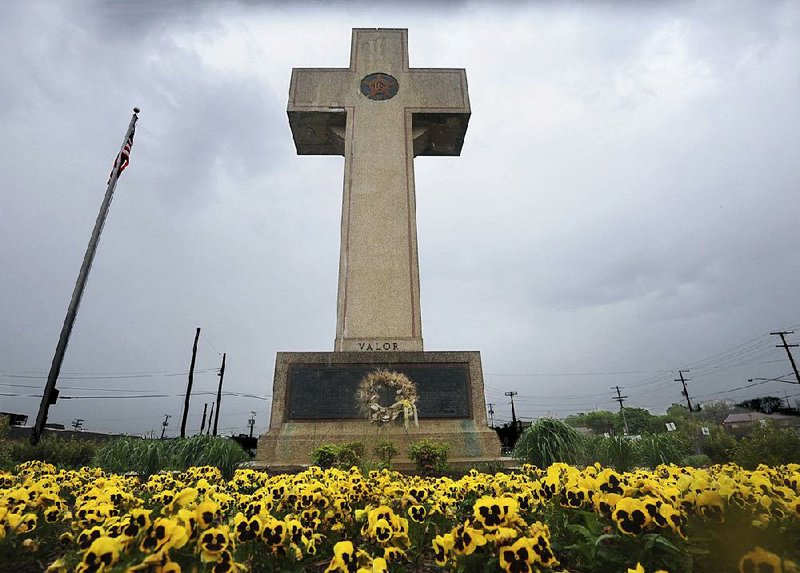WASHINGTON -- The Supreme Court agreed Nov. 2 to decide whether a 40-foot cross on state property in suburban Maryland violates the First Amendment's ban on government establishment of religion.
The case will give the court an opportunity to clarify its famously confused jurisprudence on government entanglement with religion. It will also allow the justices to continue a discussion about the meaning of crosses used in war memorials.
The cross at issue sits at a busy intersection in Bladensburg, Md., and commemorates 49 soldiers from Prince George's County who died in World War I. It was built in 1925 using contributions from local families and the American Legion.
The state took over the monument and the land under it in 1961. Since then, the state has spent more than $117,000 to maintain and repair the memorial.
Several area residents and the American Humanist Association sued to remove the cross in 2014, saying they were offended by what they said was its endorsement of Christianity.
Last year, a divided three-judge panel of the 4th U.S. Circuit Court of Appeals, in Richmond, Va., ruled that the cross sent an unconstitutional message of government approval of a particular religion, breaching the wall between church and state. The full 4th Circuit declined to rehear the case by an 8-6 vote.
In urging the Supreme Court to hear the case, the American Legion and other supporters of the cross said the logic of the 4th Circuit's decision could imperil hundreds of war memorials that use crosses to honor the fallen, including the 24-foot Canadian Cross of Sacrifice and the 13-foot Argonne Cross, both in Arlington National Cemetery.
"No other court," their petition seeking review said, "has gone so far as to hold that a long-standing, historical war memorial that was built to be a war memorial and has only ever been a war memorial was unconstitutional merely because its private builders chose to use a cross to honor their fallen loved ones."
A separate petition from state officials, referring to the monument as the Peace Cross, said the appeals court had committed a disturbing error.
"The Peace Cross has stood as a place of solemn commemoration and a source of civic unity for nearly a century," the petition said. "By compelling its removal, destruction or dismemberment, the panel's decision will necessitate an act of shocking disrespect for the brave souls of Prince George's County who died fighting for their country in World War I."
In a brief urging the justices to deny review, the challengers said the memorial honors only Christian veterans, not all of whom welcome the use of a cross in this context.
"The Fourth Circuit's decision," the brief said, "not only advances religious liberty and equality for non-Christians, but also advances religious freedom for Christians, as many Christians believe the cross's sacred status is denigrated when the government co-opts it as a symbol of war."
In the Supreme Court's last encounter with a war memorial in the form of a cross, the justices expressed varying views about the meaning of that symbol in a fractured decision that resolved very little.
"A Latin cross is not merely a reaffirmation of Christian beliefs," Justice Anthony Kennedy wrote in a plurality opinion in 2010 that was joined by Chief Justice John Roberts Jr. and Justice Samuel Alito Jr. "It evokes thousands of small crosses in foreign fields marking the graves of Americans who fell in battles, battles whose tragedies would be compounded if the fallen are forgotten."
Justice John Paul Stevens rejected that view. "The cross is not a universal symbol of sacrifice," he wrote in a dissent joined by Justices Ruth Bader Ginsburg and Sonia Sotomayor. "It is the symbol of one particular sacrifice, and that sacrifice carries deeply significant meaning for those who adhere to the Christian faith."
When the case was argued in 2009, Justice Antonin Scalia had a sharp exchange with a lawyer for the American Civil Liberties Union who said that many Jewish war veterans would not wish to be honored by "the predominant symbol of Christianity," one that "signifies that Jesus is the son of God and died to redeem mankind for our sins."
Scalia grew angry. "I don't think you can leap from that to the conclusion that the only war dead that that cross honors are the Christian war dead," he said. "I think that's an outrageous conclusion."
Scalia died in 2016, Stevens retired in 2010 and Kennedy stepped down in July. The new cases are American Legion v. American Humanist Organization, No. 17-1717, and Maryland-National Capital Park and Planning Commission v. American Humanist Association, No. 18-18.
Religion on 11/10/2018
